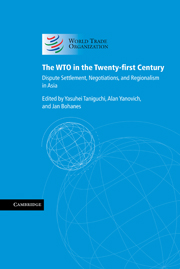Book contents
- Frontmatter
- Contents
- Notes on contributors
- Acknowledgements
- Table of dispute settlement cases and reports
- List of abbreviations
- Introduction
- PART I The WTO at Ten
- PART II Accomplishments and Future Prospects of the WTO Dispute Settlement System
- PART III Asian Perspectives on WTO Dispute Settlement
- PART IV The Doha Development Agenda and Beyond
- PART V Asian Regional Integration and the Multilateral Trading System
- 22 The adoption of the ‘Best Practices’ for regional and free trade agreements in APEC: a road towards more WTO-consistent regional trade agreements?
- 23 Trade remedy systems for East Asian free trade agreements
- 24 Free trade agreements in Asia and some common legal problems
- 25 Dispute settlement under free trade agreements: its interaction and relationship with WTO dispute settlement procedures
- 26 Regionalism under the WTO and the prospect of an East Asian free trade area
- Index
25 - Dispute settlement under free trade agreements: its interaction and relationship with WTO dispute settlement procedures
from PART V - Asian Regional Integration and the Multilateral Trading System
Published online by Cambridge University Press: 05 March 2012
- Frontmatter
- Contents
- Notes on contributors
- Acknowledgements
- Table of dispute settlement cases and reports
- List of abbreviations
- Introduction
- PART I The WTO at Ten
- PART II Accomplishments and Future Prospects of the WTO Dispute Settlement System
- PART III Asian Perspectives on WTO Dispute Settlement
- PART IV The Doha Development Agenda and Beyond
- PART V Asian Regional Integration and the Multilateral Trading System
- 22 The adoption of the ‘Best Practices’ for regional and free trade agreements in APEC: a road towards more WTO-consistent regional trade agreements?
- 23 Trade remedy systems for East Asian free trade agreements
- 24 Free trade agreements in Asia and some common legal problems
- 25 Dispute settlement under free trade agreements: its interaction and relationship with WTO dispute settlement procedures
- 26 Regionalism under the WTO and the prospect of an East Asian free trade area
- Index
Summary
Dispute settlement is an essential element of free trade agreements
Free trade agreements (FTAs) are permitted by the covered agreements of the World Trade Organization (WTO). Pursuant to Article XXIV of the General Agreement on Tariffs and Trade (GATT) 1994, the formation of free trade areas by means of voluntary agreements between WTO Members is permissible, as long as such integration meets the following main requirements: (i) the duties and other restrictive regulations of commerce are eliminated on substantially all the trade between the constituent territories in products originating in such territories; (ii) the purpose of such integration is to facilitate trade between the constituent territories and not to raise barriers to the trade of other Members with such territories; and (iii) the duties and other regulations of commerce maintained in each of the constituent territories are not higher or more restrictive than the corresponding duties and other regulations of commerce existing in the same constituent territories prior to the formation of the free trade area.
Article V of the General Agreement on Trade in Services (GATS) has similar provisions, which state in part that the GATS is not to prevent any of its Members from being a party to or entering into an agreement liberalizing trade in services between or among the parties to such an agreement, provided that such an agreement (i) has substantial sectoral coverage, and (ii) provides for the absence or elimination of substantially all discrimination, in the sense of Article XVII of the GATS, between or among the parties, in the sectors covered under subparagraph (a), through (i) elimination of existing discriminatory measures, and/or (ii) prohibition of new or more discriminatory measures.
- Type
- Chapter
- Information
- The WTO in the Twenty-first CenturyDispute Settlement, Negotiations, and Regionalism in Asia, pp. 457 - 471Publisher: Cambridge University PressPrint publication year: 2007



